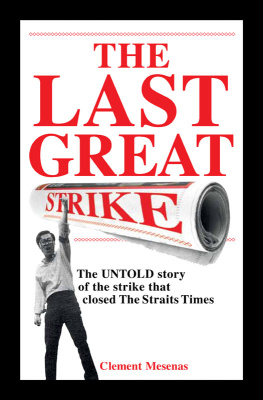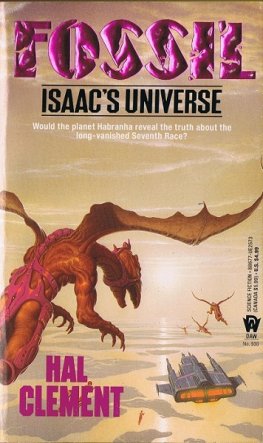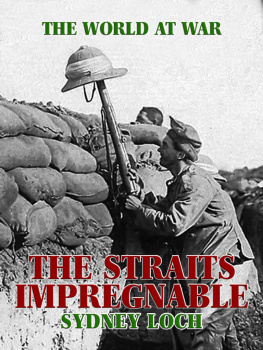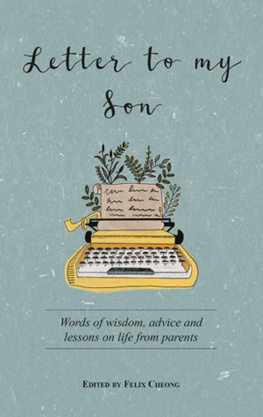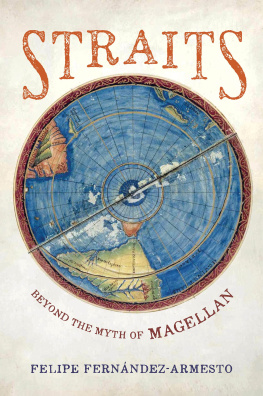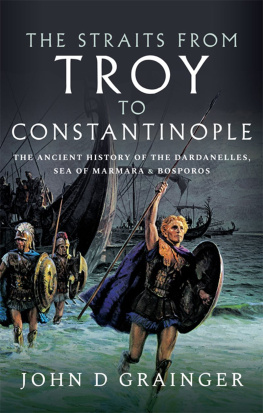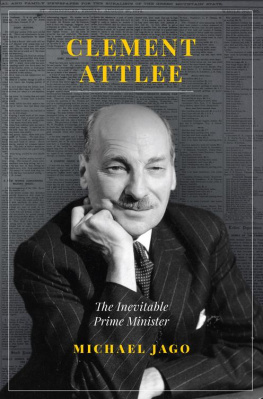Clement Mesenas writes with pride and passion this story of the last strike to cripple The Straits Times in 1971, which was to bring to a close a nasty period in management-editorial staff relations. It is more than a strike story. The writers account of newsroom life in pre-computer days should interest news junkies and those who care about the media industry.
Cheong Yip Seng
Singapores ambassador to Chile, former editor-in-chief of the English and Malay Newspapers Division of Singapore Press Holdings, and head of news desk at The Straits Times at the time of the strike
We spent Christmas in the drains outside Times House in Kim Seng Road, determined that we would guard the gates and see that they remained closed until justice was done.
Many of us became voiceless after the first day from shouting slogans to gird fellow journalists as well as strike fear into the hearts of our colonial bosses and their Asian editors. Yet we were fortified by the camaraderie of fellow young journalists along the barricades. There was ample supply of food and refreshments and words of support from a steady stream of well-wishers who encouraged us to stay strong against the powerful Straits Times management. We realised that the strike had struck more than a note of resonance with many Singaporeans.
Now, thanks to Clement Mesenas who led that union strike against The Straits Times, we can relive the magnetic atmosphere, happy that the story at last can be shared with a new generation.
Gerry de Silva
communications head, City Developments Ltd and a reporter with The Straits Times at the time of the strike
My friend Clement Mesenas has made a gallant attempt to penetrate the bigger fog that has for too long enveloped a small episode of anomalous poignancy. The passage of four decades has not made his task any easier than the intrepid struggle he led to restore the dignity and self-respect of professional colleagues and to clear the imperial detritus from Singapore journalism. It was a triumph that might have benefited the less deserving who immediately succeeded the colonial hold-overs in the name of nation building, but a victory that he and our generation are belatedly but justifiably reclaiming, through this ably written account, in the name of truth and justice.
Edgar Koh
editorial and Internet chief, United Nations Development Programme, New York (now retired), and a reporter with the New Nation at the time of the strike
I must say that this is a first-class recollection of The Straits Times strike that changed not only the journalistic world but probably the political landscape and its ramifications in the early years of Singapore. In one fell swoop, the ST strike broke the back of an archaic colonial management and lifted the pride and dignity of Singapore workers. That this was the intended outcome of the strike can be corroborated by the tacit approval granted by City Hall at the height of the tense period leading up to 23 December 1971. Kudos to Clement for recording this landmark event.
Edward Liu
group managing director of Conference & Exhibition Management Services and a reporter with The Straits Times at the time of the strike
The ground was fertile and the troops were ready. To the surprise of the ancien rgime, a new leadership emerged overnight led by Clement Mesenas An unusual man with an unusual outlook, Clement, a medical college dropout, stepped forward and accepted the mantle of leadership. This is a story that has to be told. Not just for those of us who were then working in The Straits Times. It is a story also for all past and present journalists, writers, editors and even (why not?) management and students of journalism.
Victor Ng Fook Ai
one of the Young Turks who led The Straits Times strike
Like Clement, I too was there, in December 1971, in a slightly different way! Just two months after arriving in Singapore as a junior expat-British editor of a Straits Times group magazine, I found myself targeted as management by the Strike of 71, walking a terrifying, howling picket line outside the groups Thomson Road offices. Clements account is a priceless, vivid and accurate insiders account of life in the barely postcolonial Straits Times of the 70s.
Ilsa Sharp
freelance writer and former editor of Singapore Business Monthly, assistant editor at The Business Times and associate editor (Features) at The Straits Times
Clement has written a cracker of a book. Even if you dont love that national institution called The Straits Times, he tells a gripping tale of idealism, bravado and table-banging drama featuring indignant young journalists who take their battle against their parsimonious, disdainful, white-dominated Straits Times management to the streets two days before Christmas in 1971.
How did these Young Turks dare to fight for a bigger bonus when the law said bonus was non-negotiable? Who were the cabinet ministers and national trade union leaders who acted (or declined to act) behind the scenes? Clement captures vividly the blood, sweat and tears of a newsroom and the collegial relationship between the typewriter-banging journalists and the printers who literally got the paper out.
He tells his story with gusto and humour; he has a good eye and ear for the illuminating physical detail or quote, so that everything seems as fresh as yesterday. But why should anyone care about an event that happened in 1971? Clement points to what the youthful idealism of his baby boomer generation achieved and what it failed to anticipate. In the post-strike years, with the white Straits Times management gone, the government used The Straits Times to push its policies. Clement says the question now is: Will Gen Y rise to challenge government control of the media? That is another story
Tan Wang Joo
former editor of The Sunday Nation, deputy editor of The Straits Times, and group editor of Times Periodicals (the magazine group of Singapore Press Holdings)
This book by Clement Mesenas gives vivid details of the strike. For those who were not involved or never went through the period of strikes, it is a thrilling account of what went on.
Denis Tay
former deputy president, Singapore Press Holdings
Clement knows how to write a good story, and this is his best story yet. Typewriters and strikes are unimaginable to young journalists today, and to many Singaporeans too. This book is a vivid and valuable addition to our record of times past.
Margaret Thomas
former deputy editor, The Business Times and deputy editor, TODAY
I would never have thought that Clement Mesenas, a serious journalist over the last 10 years that I have got to know him, had that rebel streak in him. His book, The Last Great Strike, highlighting his early career at The Straits Times, is hence quite revealing both of what he is made up of and of what went on at The Straits Times when it was very much a colonial edifice.
I am glad he has put on record what is a historical event, and his role in it. This is a book that will not only be of interest to readers of today but also future generations who would want to know what Singapore was like in the 70s. For those who are thinking of a career in journalism, this book will certainly be an eye-opener. I look forward to more books from Clement.
Dr Jannie Chan
executive vice-chairman, The Hour Glass Limited
The Last Great Strike tells much more than the story of a memorable week in the young lives of a group of now 60s and successful Singaporeans. This is the story of the emergence of Singapore and the indomitable will of its founder, Mr Lee, who was able to work with the Young Turks who were striking to help push out the old British guard of the leading newspaper of Singapore How and why the new government supported the strike and just what happened during the eight days of the strike makes a great read.
Next page
